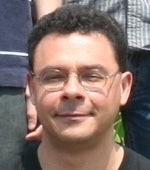
Luis Ibáñez works as Senior Software Engineer at Google Inc in Chicago. Opinions expressed in this site are his own.You can find him in github at: http://www.github.com/luisibanezand in twitter at: http://www.twitter.com/luisibanezHe previously worked as a Technical Leader at Kitware Inc., and Director of Open Source Community Development at the Open Source EHR Agent (OSEHRA). At Kitware he was closely involved in the development of open source software for medical imaging applications, in particular, working with the Insight Toolkit (ITK).Luis is a strong supporter of Open Access, and one of the editors of the Insight Journal, an OA Journal that enforces the verification of reproducibility. In collaboration with other instructors, Luis taught a course on Open Source Software Practices at RPI between 2007 and 2013, and also at the State University of New York at Albany between 2011 and 2014.Luis Ibáñez received a B.S. in Physics from the Universidad Industrial de Santander (Bucaramanga, Colombia) in 1989 and a M.S. in Optics from the same university in 1994. He received a D.E.A and Ph.D. degrees from the Universite de Rennes I (Rennes, France) in 1995 and 2000, respectively. In 1999, Luis Ibáñez joined the Division of Neurosurgery of the University of North Carolina at Chapel Hill and participated as a member of the MIDAG and CADDLab groups. His work at UNC was related to the development of algorithms for 2 and 3D registration applied to image guided surgery. He also participated as developer of the INSIGHT Registration and Segmentation Toolkit sponsored by the National Library of Medicine. Luis Ibáñez joined Kitware, Inc. in February 2002 where he was one of the main developers of the Insight Toolkit (ITK) coordinating its maintenance with other developers and the user community; he is also one of the main developers of the Image Guided Surgery Toolkit (IGSTK) and participated in crafting the operational principles of the Insight Journal. Luis Ibáñez is a strong supporter of Open Access, and the verification of reproducibility in scientific publications and is a regular speaker in ITK training courses, and in events disseminating the principles of Open Source. In August 2014, Luis joined Google Inc as Software Engineer, to work with the corporate engineering team in New York city.

Authored Comments
Flan,
Your observation is correct, in that the recommendations apply to all children irrespective of gender.
This is curiously the same (anecdotal) conclusion from a recent widely disseminated post [1] on how to encourage women to participate in a hackathon at Carnegie Mellon University. The conclusion was that, when changes were made to make the hackathon better for women, the event became better for *everyone*.
Making education better for girls, makes it better for all children.
It is interesting to see how difficult it is to encourage better education for girls, without appearing sexist. The implication of this article is not that girls have any intrinsic challenges to succeed in education, but that out-of-the-box thinking is required to, as you put it, compensate for the restrictions that certain cultures and societies impose on girls education.
It is not as simple as assuming that these cultures are less intelligent. That's an easy way out. The reality is more complex and therefore the call for action should be more thoughtful. As Carolyn points out, this is not going to be solved with a silver bullet, but by the progressive adoption of a diversity of practices and tools.
An excellent example on these initiatives is the Grace Hopper conference [2].
Role models and support networks are an integral part of such efforts.
[1] https://plus.google.com/100523810376335283165/posts/NJKcmsB99Aa
[2] http://gracehopper.org/2013
Devon,
Great article !
This is a really critical milestone for the dissemination of scientific information. It has been pointed many times that copyright is not necessary for scientific publications, given that authors do not required (nor receive in practice) any financial incentive for publishing. This is because publishing is already part of the job description of most academic positions and therefore is already compensated directly by their salaries. In practice most authors transfer their copyrights to publishers for Free and do not receive any compensation for it. On the contrary, it is common for authors to have to pay publication fees to publishers.
Moreover, a large fraction of scientific research is supported by public funds, and therefore it belongs to the larger public.
Placing the results of scientific research behind pay-walls obstructs the progress of science and technology. It is great time for scientific publications to embrace Open Access as the default mechanism for sharing information. As you nicely pointed out, we have certainly reached that tipping point.